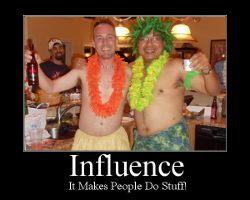
Some people say that you can learn a lot from successful people. I think it is largely true, too. It makes more sense to learn from somebody who has been successful than to learn from somebody who has not. At the same time, one thing that becomes very valuable is to learn from the mistakes they made, and use those things to avoid repeating their mistakes.
Some would say that I took a bit of an uncommon direction to learning about marketing. I dropped out of school about 25 years ago at age 15, regularly held 2-3 jobs as I built my first few companies, and nearly worked myself to death by the time I was 25. It sounds glamorous, doesn’t it?
My career path would certainly not be comfortable for most people, and I would never encourage it for my own children or anybody else I care about, but it worked for me. I learned my way through it the hard way. I read a lot of books, and I studied a lot of concepts from successful people. They were often people I knew first hand, and there were many instances when I should have listened more carefully. Since I was stubborn, I still had to learn some things the hard way, by making my own mistakes.
OK, I’ll admit, my path to learning was not totally awful, and there were a few benefits along the way. I earned more money by the end of those ten years between 15 and 25 than most people will in a whole lifetime. I retired for a few years, and it mostly seemed worth it. Yes, indeed … I had become one of those successful people like the ones I worked so hard to learn from.
Some of the greatest benefits I received were the marketing lessons I learned. Those tough lessons about marketing taught me how to bounce back from nearly any business calamity. That is because if you can market something, you can sell something, and if you can sell something you can earn profit, and let’s be honest … the majority of things that can go wrong in business can be improved with more money.
I want to share some of what I learned with you. I’ll offer a glimpse of my early years in business, and some valuable lessons it taught me about marketing. I hope it will save you some of the frustration of my mistakes. At the same time, it may scare you to imagine what it really takes to build success in a business. It is not for everybody … “average” is for everybody.
If The Doors Aren’t Swinging, The Cash Register is Silent
In my early days of business ownership, nearly 25 years ago, it was pretty easy to recognize that my business was much better when the doors were swinging open, or the telephone was ringing. Without enough customers, I wasn’t selling enough, and selling something was how my company generated revenue … money … profit. You know, the stuff that sets the difference between a hobby and a business.
I needed to attract customers, and I knew it would take some pretty clever marketing to keep my company moving forward. Without marketing, even the best companies fail. I had seen such failure in other companies, so I knew I needed to get that part right.
Of course, marketing comes in many forms, and it involves many aspects of a business. It includes product assessment, pricing, merchandising, public relations, and more. Focusing on just one area of marketing is short-sighted, and leads to a lot of waste. What I knew for sure was that if I didn’t do something and do it right, I would never grow the company into anything sustainable. First things first, I needed to generate some money to make the whole thing work.
Sales reps were not worth a garage sale necktie to me if I didn’t have the right product offering. So, I worked on our offerings to be sure they were better than the competition. The sales reps were also no good to me if I could not legitimately define why the offerings were the best option in the market for our given customers. That meant I needed some product research. That’s when I realized the product research and the customers had to match up just right. It would not matter how awesome the offering was, or how well we could merchandise it, if we did not understand who would benefit from it the most, and would have a greater propensity to respond to our efforts. That’s right … “everybody” is not a target market.
I researched like mad to put all the pieces together. I got the products just right, the pricing was attractive, and I ran great ads to get bodies through the door, but then I figured out that there were good customers, and then there were great customers. I needed to determine how to get the right customers through the door. When I learned how to do that, our profits grew like mad. With all that research to my advantage, advertising cost went down because it became more effective.
You see, it took a lot of little pieces to be put in their proper place in order to grow. It took a lot of very time-consuming and often high-investment efforts to create success.
Putting all those little pieces in the right order and in their rightful place is even more important now than ever, in the digital world. The competition is broader, the offerings are sharper, and getting people to a website is not at all the same as getting the right people to a website. Once you get them there, you will need very compelling reasons they will want to do business with you. My early experiences really helped me to understand this.
Here comes a lesson that came really hard for me, but it makes a huge impact once you get it right.
Who You Are is Not a Microcosm of Your Market!
You are not the same as your customers and potential customers. You may try to be like them, you may try to speak their language, and you may even be part of a very similar demographic, but the truth is that they are different. We each want to believe those warm and friendly lines like “people are not so different after all” … but they are!
It is very challenging to try and understand your perfect market segment, and how to reach them with the right message. It is a bit unnatural, because it requires thinking in a way that is not your usual way of thinking. They are the customer, and they will always have their own perspective, their own experiences, their own mindset … and you will have yours.
During my earliest days in business, I remember a constant nagging question of “Who are these people?” I’ve got to say that as much as I tried, I couldn’t wrap my mind around it. I understood them in concept and in statistics, but I still could not relate to their ways of thinking. Fortunately, I didn’t need to nor want to become more like them. It is true but misunderstood that you do not have to “become your customer” to provide their best option … but you will need to know a lot about them. I was selling very expensive things to very egotistical people. I knew exactly why they would buy, and I knew that it was all about stroking their ego.
What I couldn’t grasp was why they were so willing to endure all of that opportunity cost just to splurge on luxury items. They were buying things that I felt I could never afford. The crazy part was that I would constantly find that my customers were actually earning only a fraction of what I was.
The big separation for me was that I was in a different stage of my life, and in a different mind capsule of my own. I believed in taking every dollar I earned to further build my businesses, and buying showy things just didn’t fit into my model (until much later).
There are many things which can separate us from the mindset of our customers, and it is usually not a simple task to figure it out. In my case, it became my most monumental career objective to understand the gaps between customer and seller perspectives … and to bridge those gaps.
One of the best and hardest lessons I learned was that it usually takes a fresh set of eyes looking from outside. That means outside of the buyer’s perspective, and outside of the seller’s perspective. Analysis from a complete outsider is one of the best ways to understand the gaps between sellers and customers. I am lucky I learned this early, and I will always value the outsider. This can be a friend, an associate, or a trade organization, but it is even better when it is their job to serve your company needs and expectations. You can be afraid of the truth, but it will not change the truth. The best outsider is often in the form of a trained and experienced marketing consultant.
The funny thing is this: I am a marketing consultant, and in fact, I am a very accomplished marketing consultant … but knowing what I know, I will never stop using them. Yes, it probably sounds totally nuts to you, but I rely on outsiders to provide the same services that others pay me to provide.
The reason I use outside marketing consultants is that for as much as I can do the research, bring you to discover me, know your hot buttons, and even address them fairly well, I will never completely understand you, or why you are not buying my services. If I tried to understand you all on my own, without influences from the outside, I would destroy many of my greatest opportunities. I would also likely go even crazier than I already am.
Delegating Saved Me More Than Once
I learned that one of the most profound commonalities of successful people is knowing when and how to delegate things outside of their expertise. They realize their limitations, and the value of concentrating their efforts on the things they are best suited for. They recognize what they don’t know, and they become good at finding the right people to handle those things.
I learned to delegate. It was terrifying to me, and I never got really comfortable with handing the controls over to somebody else. I hated that my accountants and attorneys often knew more about me than my own mother. I also hated the thought that my marketing consultants have often known enough about my businesses to try and mirror my company and become my competition.
I thank my lucky stars that I got over it and realized that I cannot be the very best at everything. I am absolutely terrible at accounting! All I want to know is that there is enough money in the accounts to carry out my purchases. I generally grasp the whole legal thing, but I hate writing my own contracts, and I understand why they say that “the lawyer who defends himself has a fool for a client.” A similar principle holds true in marketing. If you rely on your own brilliance, without outside influence, you will make mistakes … and often very costly mistakes.
If Building Success Was Easy, Wouldn’t Your Market Share Be Higher?
Building a successful business is not easy, and it requires a lot of uncomfortable decisions. If it was easy, it would be easy for your competition, too. A key factor lies in your will to achieve more.
There will always be people to dislike you for doing the things they are unwilling or unable to do. There will always be people to try and roadblock your success. You may often create your own biggest roadblocks based on other people’s frustrations. I know this, and I can almost bet that it is like fingernails on a chalkboard to many people when I say I’ve spent much of my adult life in the top fraction of a percent of money-earners in the USA and in the world. Yeah, that’s annoying to the people who have not joined me there, and have no hopes of achieving the same or similar results.
I really enjoyed and related to an article my friend John Falchetto recently wrote titled “5 reasons jerks are successful“. I hate to give away the ending, but the fact is that they are not jerks at all. They just work very hard and have very strong commitments. I encourage you to read it and also read the comments on the article. I had a lot to say about it.
I know that there is a huge deluge of information telling you that you can do it all yourself, and that you can reach a huge audience of all the right people with the perfect message about your company and make your product or service offering so popular the phones will ring all night and day.
If you really believed it was so simple, I think you must ask yourself “Why isn’t my market share higher?” or “why am I still reading this blog?” You want more business … that’s why.
Let this roll around in your head for a while: If you were given all the right resources to market your company, would it become as successful as you hoped it would be? Either way you answer, this should require you to consider what mistakes you are making and which required resources you are missing. It very likely has a whole lot to do with your marketing.
Photo Credit:
Separation Anxiety by j bizzie via Flickr
Podcast: Play in new window | Download



